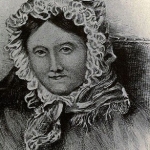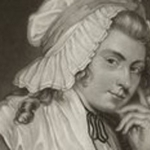The time is come I must departe
from thee, ah, famous Citie:
I never yet, to rue my smart,
did finde that thou hadst pitie,
Wherefore small cause ther is, that I
should greeve from thee to go:
But many Women foolyshly,
lyke me, and other moe.
Doe such a fyxed fancy set,
on those which least desarve,
That long it is ere wit we get,
away from them to swarve,
But tyme with pittie oft wyl tel
to those that wil her try:
Whether it best be more to mell,
or vtterly defye.
And now hath time me put in mind,
of thy great cruelnes:
That never once a help wold finde,
to ease me in distres.
Thou never yet woldst credit geve
to boord me for a yeare:
Nor with Apparell me releve
except thou payed weare.
No, no, thou never didst me good,
nor ever wilt, I know:
Yet am I in no angry moode,
but wyll, or ere I goe,
In perfect love and charytie
my Testament here write:
And leave to thee such Treasurye,
as I in it recyte.
Now stand a side and geve me leave
to write my latest Wyll:
And see that none you do deceave,
of that I leave them tyl.
I whole in body, and in minde,
but very weake in Purse:
Doo make, and write my Testament
for feare it wyll be wurse.
And fyrst I wholy doo commend,
my Soule and Body eke:
so long as I can speake.
And after speach: my Soule to hym,
and Body to the Grave:
Tyll time that all shall rise agayne,
their Judgement for to have.
And then I hope they both shal meete.
to dwell for aye in ioye:
Whereas I trust to see my Friends
releast, from all annoy.
Thus have you heard touching my soule,
and body what I meane:
I trust you all wyll witnes beare,
I have a stedfast brayne.
And now let mee dispose such things,
as I shal leave behinde:
That those which shall receave the same,
may know my wylling minde.
I firste of all to London leave
because I there was bred:
Braue buildyngs rare, of Churches store,
and Pauls to the head.
Betweene the same: fayre streats there bee,
and people goodly store:
Because their keeping craveth cost,
I yet wil leave him more.
First for their foode, I Butchers leave,
that every day shall kyll:
By Thames you shal have Brewers store,
and Bakers at your wyll.
And such as orders doo obserue,
and eat fish thrice a weeke:
I leave two Streets, full fraught therwith,
they neede not farre to seeke.
Watlyng Streete, and Canwyck streete,
I full of Wollen leave:
And Linnen store in Friday streete,
if they mee not deceave.
And those which are of callyng such,
that costlier they require:
I Mercers leave, with silke so rich,
as any would desyre.
In Cheape of them, they store shal finde
and likewise in that streete:
I Goldsmithes leave, with Iuels such,
as are for Ladies meete.
And Plate to furnysh Cubbards with,
full braue there shall you finde:
With Purle of Siluer and of Golde,
to satisfye your minde.
With Hoods, Bungraces, Hats or Caps,
such store are in that streete:
As if on ton side you should misse
the tother serues you feete.
For Nets of every kynd of sort,
I leave within the pawne:
French Ruffes, high Purles, Gorgets and Sleeves
of any kind of Lawne.
For Purse or Kniues, for Combe or Glasse,
or any needeful knacke
I by the Stoks have left a Boy,
wil aske you what you lack.
I Hose doo leave in Birchin Lane,
of any kynd of syse:
For Women stitchte, for men both Trunks
and those of Gascoyne gise.
Bootes, Shoes or Pantables good store,
Saint Martins hath for you:
In Cornwall, there I leave you Beds,
and all that longs thereto.
For Women shall you Taylors have,
by Bow, the chiefest dwel:
In every Lane you some shall finde,
can doo indifferent well.
And for the men, few Streetes or Lanes,
but Bodymakers bee:
And such as make the sweeping Cloakes,
with Gardes beneth the Knee.
Artyllery at Temple Bar,
and Dagges at Tower hyll:
Swords and Bucklers of the best,
are nye the Fleete vntyll.
Now when thy Folke are fed and clad
with such as I have namde:
For daynty mouthes, and stomacks weake
some Iunckets must be framde.
Wherfore I Poticaries leave,
with Banquets in their Shop:
Phisicians also for the sicke,
Diseases for to stop.
Some Roysters styll, must bide in thee,
and such as cut it out:
That with the guiltlesse quarel wyl,
to let their blood about.
For them I cunning Surgions leave,
some Playsters to apply.
That Ruffians may not styll be hangde,
nor quiet persons dye.
For Salt, Otemeale, Candles, Sope,
or what you els doo want:
In many places, Shops are full,
I left you nothing scant.
Yf they that keepe what I you leave,
aske Mony: when they sell it:
At Mint, there is such store, it is
vnpossible to tell it.
At Stiliarde store of Wines there bee,
your dulled mindes to glad:
And handsome men, that must not wed
except they leave their trade.
They oft shal seeke for proper Gyrles,
and some perhaps shall fynde:
(That neede compels, or lucre lures
to satisfye their mind.)
And neare the same, I houses leave,
for people to repayre:
To bathe themselues, so to preuent
infection of the ayre.
On Saturdayes I wish that those,
which all the weeke doo drug:
Shall thyther trudge, to trim them vp
on Sondayes to looke smug.
Yf any other thing be lackt
in thee, I wysh them looke:
For there it is: I little brought
but nothyng from thee tooke.
Now for the people in thee left,
I have done as I may:
And that the poore, when I am gone,
have cause for me to pray.
I wyll to prisons portions leave,
what though but very small:
Yet that they may remember me,
occasion be it shall:
And fyrst the Counter they shal have,
least they should go to wrack:
Some Coggers, and some honest men,
that Sergantes draw a back.
And such as Friends wyl not them bayle,
whose coyne is very thin:
For them I leave a certayne hole,
and little ease within.
The Newgate once a Monthe shal have
a sessions for his share:
Least being heapt, Infection might
procure a further care.
And at those sessions some shal skape,
with burning nere the Thumb:
And afterward to beg their fees,
tyll they have got the some.
And such whose deedes deserueth death,
and twelue have found the same:
They shall be drawne vp Holborne hill,
to come to further shame:
Well, yet to such I leave a Nag
shal soone their sorowes cease:
For he shal either breake their necks
or gallop from the preace.
The Fleete, not in their circuit is,
yet if I geve him nought:
It might procure his curse, ere I
unto the ground be brought.
Wherfore I leave some Papist olde
to vnder prop his roofe:
And to the poore within the same,
a Boxe for their behoofe.
What makes you standers by to smile.
and laugh so in your sleeve:
I thinke it is, because that I
to Ludgate nothing geve.
I am not now in case to lye,
here is no place of iest:
I dyd reserve, that for my selfe,
yf I my health possest.
And ever came in credit so
a debtor for to bee.
When dayes of paiment did approch,
I thither ment to flee.
To shroude my selfe amongst the rest,
that chuse to dye in debt:
Rather then any Creditor,
should money from them get.
Yet cause I feele my selfe so weake
that none mee credit dare:
I heere reuoke: and doo it leave,
some Banckrupts to his share.
To all the Bookebinders by Paulles
because I lyke their Arte:
They e'ry weeke shal mony have,
when they from Bookes departe.
Amongst them all, my Printer must,
have somwhat to his share:
I wyll my Friends these Bookes to bye
of him, with other ware.
For Maydens poore, I Widdoers ritch,
do leave, that oft shall dote:
And by that meanes shal mary them,
to set the Girles aflote.
And wealthy Widdowes wil I leave,
to help yong Gentylmen:
Which when you have, in any case
be courteous to them then:
And see their Plate and Iewells eake
may not be mard with rust.
Nor let their Bags too long be full,
for feare that they doo burst.
To e'ry Gate vnder the walles,
that compas thee about:
I Fruit wives leave to entertayne
such as come in and out.
To Smithfeelde I must something leave
my Parents there did dwell:
So carelesse for to be of it,
none wolde accompt it well.
Wherfore it thrice a weeke shall have,
of Horse and neat good store,
And in his Spitle, blynd and lame,
to dwell for evermore.
And Bedlem must not be forgot,
for that was oft my walke:
I people there too many leave,
that out of tune doo talke.
At Bridewel there shal Bedelles be,
and Matrones that shal styll
See Chalke wel chopt, and spinning plyde,
and turning of the Mill.
For such as cannot quiet bee,
but striue for house or Land:
At Th' innes of Court, I Lawyers leave
to take their cause in hand.
And also leave I at ech Inne
of Court, or Chauncerye:
Of Gentylmen, a youthfull roote,
full of Actiuytie:
For whom I store of Bookes have left,
at each Bookebinders stall:
And parte of all that London hath
to furnish them withall.
And when they are with study cloyd:
to recreate theyr minde:
Of Tennis Courts, of dauncing Scooles,
and fence they store shal finde.
And every Sonday at the least,
I leave to make them sport.
In diuers places Players, that
of wonders shall reporte.
Now London have I (for thy sake)
within thee, and without:
As coms into my memory,
dispearsed round about
Such needfull thinges, as they should have
heere left now unto thee:
When I am gon, with consience,
let them dispearced bee.
And though I nothing named have,
to bury mee withall:
Consider that aboue the ground,
annoyance bee I shall.
And let me have a shrowding Sheete
to couer mee from shame:
And in obliuyon bury mee
and never more mee name.
Ringings nor other Ceremonies,
vse you not for cost:
Nor at my buriall, make no feast,
your mony were but lost.
Reioyce in God that I am gon,
out of this vale so vile.
And that of ech thing, left such store,
as may your wants exile.
I make thee sole executor, because
I lou'de thee best.
And thee I put in trust, to geve
the goodes unto the rest.
Because thou shalt a helper neede,
In this so great a chardge,
I wysh good Fortune, be thy guide, least
thou shouldst run at lardge.
The happy dayes and quiet times,
they both her Seruants bee.
Which well wyll serue to fetch and bring,
such things as neede to thee.
Wherfore (good London) not refuse,
for helper her to take:
Thus being weake and wery both
an end heere wyll I make.
To all that aske what end I made,
and how I went away:
Thou answer maist like those which heere,
no longer tary may.
And unto all that wysh mee well,
or rue that I am gon:
Doo me comend, and bid them cease
my absence for to mone.
And tell them further, if they wolde,
my presence styll have had:
They should have sought to mend my luck;
which ever was too bad.
So fare thou well a thousand times,
God sheelde thee from thy foe:
And styll make thee victorious,
of those that seeke thy woe.
And (though I am perswade) that I
shall never more thee see:
Yet to the last, I shal not cease
to wish much good to thee.
This, xx. of October I,
in ANNO DOMINI:
A Thousand: v. hundred seuenty three
as Alminacks descry.
Did write this Wyll with mine owne hand
and it to London gaue:
In witnes of the standers by,
whose names yf you wyll have.
Paper, Pen and Standish were:
at that same present by:
With Time, who promised to reveale,
so fast as she could hye
The same: least of my nearer kyn,
for any thing should vary:
So finally I make an end
no longer can I tary.


















Comment form: